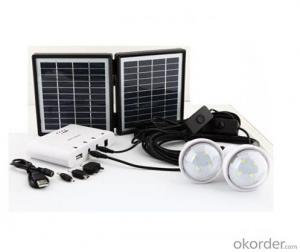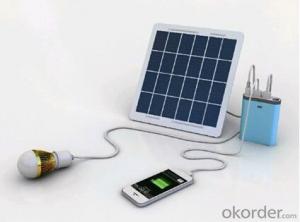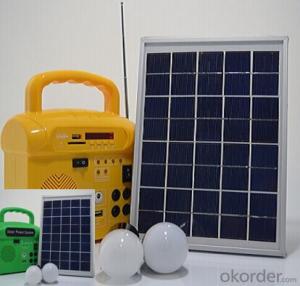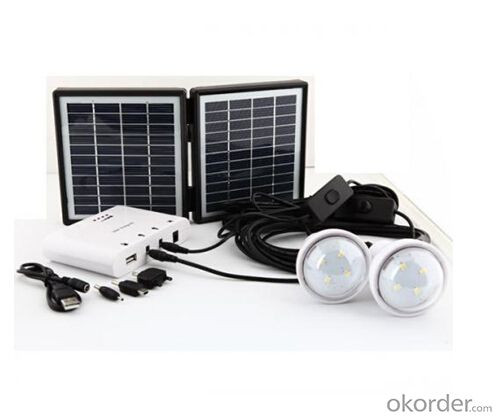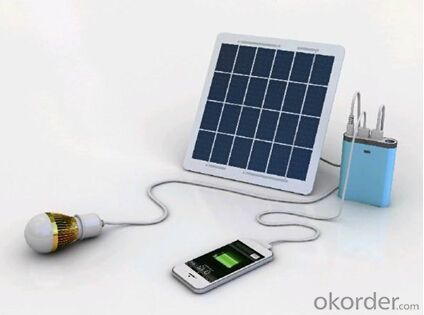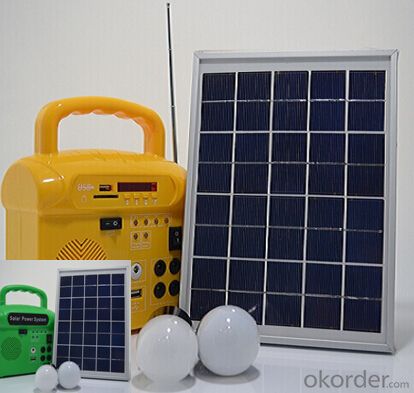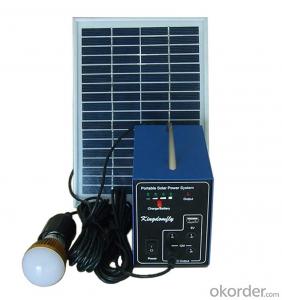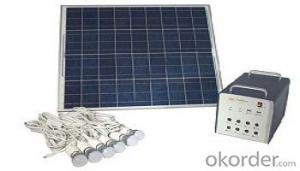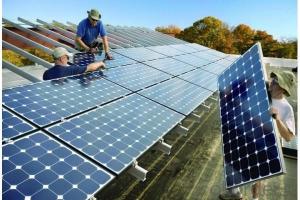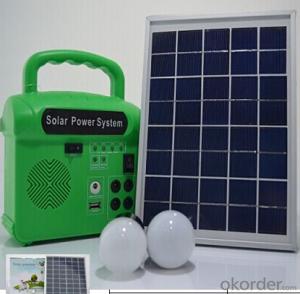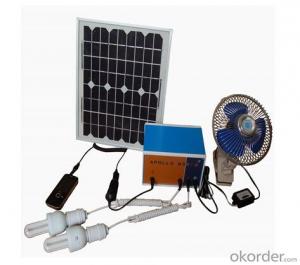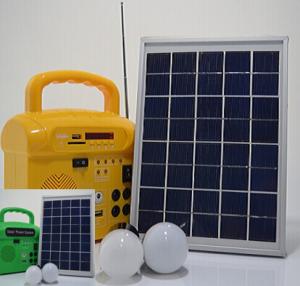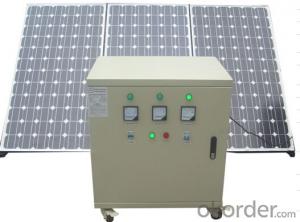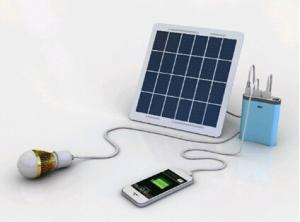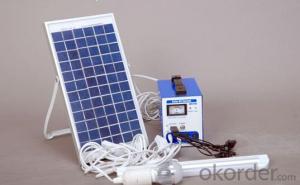Passive Solar Energy Systems CNBM Solar Home System Roof System Capacity-10w
- Loading Port:
- Shanghai
- Payment Terms:
- TT or LC
- Min Order Qty:
- 5 unit
- Supply Capability:
- 30000 unit/month
OKorder Service Pledge
OKorder Financial Service
You Might Also Like
Introduction of Solar Home System
Solar Home System is composed by Solar Panels, Inverters, Charger Controller, Battery, Cable, Mounting Bracket, which is applied to produce electricity for home use.
Solar Home System is quite suitable product in urban area and the place which is short of electricity. Our Small Solar Home System own great benifits compare with other kind electricity resources:
Electricity generating cost of Solar Home System is much cheaper than diesel engine. Beside low electricity making cost, solar system products also have the features of noiseless, clean energy, environmentally friendly and can access to many different electric appliance.
Our company’s main target is to make every family can use cheap solar energy and enjoy the new innovation of modern science and technology.
Working Principle of Solar Home System
The stand alone Solar Home System is an off-grid solar system which uses batteries to store the solar energy. Stand alone solar system solutions design for those who are not able or willing to connect to electricity grid.
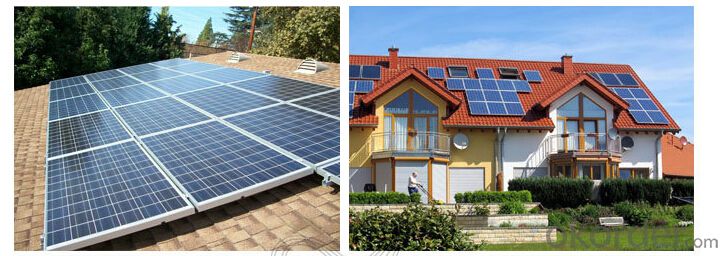


Specification of Solar Home System
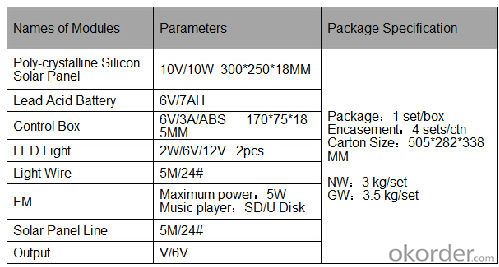
Terms and Conditions
1. Trade terms: FOB Shanghai
2. Payment terms: 30% T/T, balanced before shipment/ LC at sight before shipment. Actual Terms can be negotiated for big order.
3. Package: Exported standard package suitable for tough handling and sea transport.
4. Delivery: Goods to be ready within 10~30 days depending on order quantity.
5. Warranty: 10 years for solar panel, 2 years for controller/inverter/battery.
FAQ
Q: Could you introduce the background of your company?
A: We are a Group corp. with 1GW capacity in China, which is Okorder’s registered VIP Supplier, possess Financial Service from Okorder.com.
Q: Required mainly certificates (CE&IEC/TUV/RoHS)?
A: Our products are certificated by CE RoHS, IEC, ISO, TUV, UL etc.
Q: Your main exported market is?
A: Main markets of our products is: South-east Asia, Mid-east, Arica, East Europe and Latin America.
- Q: Can solar energy systems be installed on flat surfaces?
- Yes, solar energy systems can be installed on flat surfaces such as roofs or ground-mounted structures.
- Q: How do solar energy systems impact air quality?
- Solar energy systems have a positive impact on air quality as they produce electricity without emitting any harmful pollutants or greenhouse gases into the atmosphere. By replacing fossil fuel-based power plants, solar energy helps reduce air pollution, smog, and respiratory diseases, leading to cleaner and healthier air for everyone.
- Q: Are solar energy systems suitable for residential use?
- Yes, solar energy systems are suitable for residential use. They can provide clean and renewable energy, reduce electricity bills, and contribute to overall environmental sustainability. With advancements in technology and decreasing costs, solar panels have become more affordable and efficient, making them a viable option for homeowners looking to generate their own electricity and reduce their carbon footprint.
- Q: Can solar energy systems be used in powering construction sites or temporary structures?
- Solar energy systems are certainly capable of powering construction sites or temporary structures. In fact, the utilization of solar power in these situations is growing due to its many advantages. To begin with, construction sites often lack access to conventional power sources, making solar energy a practical solution. Solar panels can be easily installed on rooftops, scaffolding, or even on the ground, providing a dependable source of electricity throughout the construction process. Moreover, solar energy systems offer flexibility in power generation. They can be tailored to meet the specific energy demands of construction sites, whether it be for powering tools, lighting, or charging equipment. This adaptability ensures that construction activities can proceed seamlessly without any disruptions. Additionally, solar energy systems are environmentally friendly. By harnessing energy from the sun, construction sites can significantly reduce their carbon footprint and contribute to sustainable practices. Solar power does not generate harmful emissions or noise pollution, which is particularly advantageous in urban areas or sensitive environments. Furthermore, solar energy systems provide long-term cost savings. Although the initial investment for installing solar panels might be higher compared to traditional generators, the ongoing operational costs are substantially lower. Construction sites can benefit from reduced fuel expenses, maintenance costs, and a reduced reliance on fossil fuels. It is worth noting that solar energy systems can also be utilized for temporary structures such as mobile offices, portable restrooms, or event venues. These structures can be conveniently powered using solar panels, eliminating the need for generators or grid connections. In conclusion, solar energy systems are a practical and sustainable choice for powering construction sites and temporary structures. They offer reliable, customizable, and cost-effective power solutions while minimizing the impact on the environment. As the global shift towards renewable energy continues, solar power is likely to become even more prevalent in the construction industry.
- Q: Can solar energy systems be used in powering wineries or breweries?
- Yes, solar energy systems can definitely be used to power wineries or breweries. In fact, many wineries and breweries around the world have already embraced solar power as a sustainable and cost-effective energy source. Solar energy systems can be installed on the rooftops or surrounding areas of these facilities to capture sunlight and convert it into electricity. The electricity generated from solar panels can be used to power various aspects of winemaking or brewing operations, such as lighting, heating, cooling, and machinery. It can also be used to run pumps for irrigation or ventilation systems, which are crucial for maintaining the ideal conditions for the fermentation process. Using solar power not only helps wineries and breweries reduce their carbon footprint and dependence on fossil fuels but also offers several financial benefits. Solar energy systems can significantly lower utility bills, as wineries and breweries often require a substantial amount of electricity to operate. Additionally, some regions offer incentives and tax credits for businesses that adopt renewable energy sources like solar power. Moreover, solar energy systems can provide wineries and breweries with energy independence and reliability. They can generate electricity even during power outages or during peak demand periods when electricity prices are higher. This ensures uninterrupted production and reduces the vulnerability of these facilities to energy shortages or price fluctuations. Overall, solar energy systems have demonstrated their effectiveness in powering wineries and breweries, offering environmental, financial, and operational advantages. By harnessing the power of the sun, these industries can contribute to a more sustainable future while enjoying the numerous benefits of solar energy.
- Q: Can solar energy systems be used in areas with limited access to solar mounting systems?
- Yes, solar energy systems can still be used in areas with limited access to solar mounting systems. In such cases, alternative mounting options like ground mounts, pole mounts, or even innovative solutions like floating solar panels can be employed to harness solar energy effectively. Additionally, advancements in solar technology have also made it possible to install solar panels on buildings or structures with unconventional designs, further expanding the possibilities for utilizing solar energy in areas with limited access to traditional mounting systems.
- Q: Can a solar energy system be used in conjunction with other renewable energy sources?
- Yes, a solar energy system can definitely be used in conjunction with other renewable energy sources. In fact, combining multiple renewable energy sources is often referred to as a hybrid renewable energy system, which can have several advantages. By combining solar energy with other sources such as wind, hydro, or geothermal energy, a hybrid system can provide a more reliable and consistent power supply. This is because different renewable energy sources have different patterns of energy generation, and combining them can help to compensate for any fluctuations or limitations in one particular source. For example, solar energy production is highest during the day, while wind energy can be more consistent throughout the day and night. By integrating these two sources, the system can provide a continuous power supply. Additionally, using multiple renewable energy sources can help to maximize the overall energy production and efficiency of the system. Each source has its own strengths and weaknesses, and combining them can help to increase the total energy output. This is especially valuable in situations where the energy demand is high or when one particular source may not be sufficient to meet the energy needs. Furthermore, a hybrid renewable energy system can also provide greater energy independence and resilience. By diversifying the energy sources, the system becomes less reliant on a single source and therefore less vulnerable to disruptions or failures. This is particularly important in remote or off-grid areas where access to a reliable power supply is crucial. In conclusion, a solar energy system can be effectively used in conjunction with other renewable energy sources to create a hybrid system. This approach offers several advantages, including increased reliability, improved efficiency, and enhanced energy independence. By combining multiple renewable energy sources, we can take advantage of their individual strengths and create a more sustainable and resilient energy system.
- Q: Are there any risks of electrical hazards during installation or maintenance of solar energy systems?
- Yes, there are inherent risks of electrical hazards during the installation or maintenance of solar energy systems. These hazards can arise from working with high-voltage DC electricity, improper grounding, accidental contact with live wires, or faulty equipment. It is crucial to follow safety protocols, receive proper training, use personal protective equipment, and engage qualified professionals to minimize these risks and ensure a safe working environment.
- Q: Can solar energy systems be connected to the grid?
- Yes, solar energy systems can be connected to the grid. This connection allows excess electricity generated by the solar panels to be sent back to the grid, earning credits or compensation for the owner while also providing clean energy to the grid for others to use.
- Q: How do solar energy systems store excess energy?
- Solar energy systems store excess energy by using batteries or a process called net metering. With batteries, the excess energy generated by the solar panels is stored in these batteries for later use when the panels are not producing enough energy, such as during the night or on cloudy days. Net metering, on the other hand, allows the excess energy to be fed back into the grid, where it is credited to the owner's account. This excess energy can then be used at a later time when the solar panels are not producing enough power.
Send your message to us
Passive Solar Energy Systems CNBM Solar Home System Roof System Capacity-10w
- Loading Port:
- Shanghai
- Payment Terms:
- TT or LC
- Min Order Qty:
- 5 unit
- Supply Capability:
- 30000 unit/month
OKorder Service Pledge
OKorder Financial Service
Similar products
Hot products
Hot Searches
Related keywords
